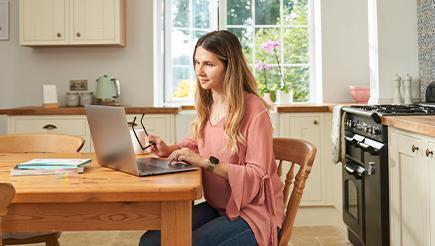Renting a house out sounds like a simple enough job: find a good buy-to-let opportunity, let it out to some good tenants and collect the rental income each month.
However, as a landlord you have a number of responsibilities to your tenants, many of them legal requirements, which can make the job more complicated than you might’ve first imagined. To help you out, this landlord guide outlines some of the key considerations you should be ticking off your renting out a house checklist as you become a landlord for the first time, plus some useful information for existing landlords too.
Be aware of landlord costs
Becoming a landlord isn't always as straightforward as renting a house out and collecting the rent. There are additional and ongoing costs associated with being a landlord too.
Landlords are usually responsible for repairs to the property, so if something goes wrong or if something breaks in the property, it’s up to you to pay for the repairs. This might be something small like replacing a broken light fitting, or it could be larger issues like replacing a boiler. You'll also need to pay for ongoing maintenance and making sure the property is up to code, but there's more information on that below.
Usually, costs like Council Tax are paid for by the tenant, not the landlord. However, if the landlord subdivides their property and rents it out to tenants who all have separate rental agreements, the landlords can become responsible for paying the council tax for the whole property.
If you join a landlord association, there may be costs involved here too. The largest landlord association In the UK is the National Landlords Association, and annual membership starts at £89. In Scotland, membership of the Scottish Association of Landlords starts at £100.
For more on the Hidden Costs of Being A Landlord, visit AXA's guide.
Carry out health and safety checks
Becoming a landlord means there are a number of health and safety guidelines that must be followed to prevent tenants from being injured and you, as the landlord, from being sued. These responsibilities include the legal requirement to have all gas-related equipment serviced at least once every 12 months by a Gas Safe registered technician.
Any electrical appliances provided to the tenant are subject to regular servicing and an electrical safety check. A qualified electrician should carry out a portable appliance test (PAT) once every 12 months on appliances to ensure they are fit for purpose and that your tenants are not at risk by using them. Records should be kept of all safety inspections and repairs.
Visit our landlord guide to electrical safety regulations here.
Carry out fire safety checks
It is a compulsory requirement in the UK that smoke and carbon monoxide alarms be fitted in rented accommodation. The regulation states that at least one smoke alarm be installed on every storey of the rental accommodation and in each of the main living areas. These alarms should also be interconnected and mains wired. Placing a carbon monoxide alarm in any room with a solid fuel burning appliance is also mandatory, although this can be battery operated.
From February 2021 in Scotland, every home in Scotland must meet a 'Tolerable Standard' by having ceiling mounted smoke alarms in every circulation space including hallways, smoke alarms in the rooms most frequently used such as the living room, a heat alarm in the kitchen and a Carbon Monoxide alarm where there is a fuel burning appliance or flue. In rented properties, the responsibility for meeting these guidelines must be met by the landlord.
As the landlord, you must make sure the alarms are in working order at the start of each new tenancy. Failure to comply with this requirement can result in a fine of up to £5,000. Fire doors and fire extinguishers are mandatory for HMO properties, with the latter checked once every 12 months by a qualified professional.
Carry out a tenant reference check
Tenant background checks will help shed light on your tenant's previous renting history, financial history and even a character reference, so it's a good way of making sure you're leaving your rental property in good hands.
Professional referencing companies usually charge anywhere between £15 and £40 to carry out a tenant referencing check on your behalf, but you can carry out checks yourself.
A typical tenant reference check can include:
- Three months' bank statements
- Credit check
- Employer reference
- Guarantor reference (If required)
- Proof of previous addresses and a previous landlord reference
- Proof of identity
- Right to rent certification
For more about tenant reference checks, visit AXA's guide.
Set the right rent
As a landlord, you want to make a decent income from your rental property. Set the rent too high, however, and you may chase away prospective tenants. According to Zoopla, the average rental price in the UK in 2019 was £886pcm, an annual increase of 2.6%, showing that the private rental sector is growing. But what does that mean if you're becoming a landlord? Speak to local letting agents to get an idea of how much the local market value for a rental property is in your area - there are also a number of resources online. Tenants have the right to challenge the landlord if they feel the rent is too high. It is also a legal obligation of the landlord to be able to provide a record of all payments and receipts for rent paid during the tenancy.
Keep the tenant’s deposit safe
Since 6 April 2007 in England and 7 March 2011 in Scotland it has been a legal requirement to protect your tenants’ deposit by placing it in a tenancy deposit protection scheme, such as mydeposits. There are a number of Government-backed schemes available, but they all guarantee that your tenants will get their deposit back if they meet the terms of your tenancy agreement, don’t cause any damage to the property, and pay their rent and bills. As the landlord, you must put your tenants’ deposit in the scheme within 30 days of getting it.
Consider a letting agent
Many landlords choose to let and manage their properties themselves. This can give you greater control over the running of your property and could save you some money in agency fees. Using an agent, however, can make the process much easier and is a worthy consideration. This is particularly true if you don’t have the time to manage the property, if you own more than one property (making the process intensive), or if you are not as familiar with the property market and legal requirements. Choosing a good agent is made easier by selecting one with accreditation, for example, from the Association of Residential Letting Agents (ARLA).
To help decide whether to manage your property yourself or to go through a letting agent, take a look at AXA's guide Landlord vs Letting Agent here.
Get accreditation as a landlord
As a landlord, you must ensure that you register yourself with the local council in your area. If you let several properties and consider managing them to be your sole business, then you might consider joining a landlord association. There are more than 50 Acts of Parliament and more than 70 sets of regulations that govern the private rental sector. Joining a body such as the Residential Landlord Association (RLA) can offer you help and advice in managing your property and dealing with the legal requirements of being a landlord. Being a member of a landlord association may also make you more attractive to prospective tenants, as they will know that you abide by the regulatory requirements for becoming a landlord.
Decoration
Keeping your property’s décor up to date is a great idea and can help attract potential tenants. If you choose to provide your tenants with furniture you must ensure that it complies with the Furniture and Furnishings (Fire Safety) Regulations 1988. This is a legal requirement that requires all furniture to have set levels of fire resistance for domestic upholstered furniture. If you’re providing your tenant with more than just furniture, make sure that you keep an inventory of all items in the rental property and give a copy to the tenant. This will help avoid any disputes if anything is damaged or goes missing during the tenancy.
Houses in Multiple Occupation (HMO) checks
An HMO property is classed as any property occupied by at least three tenants who are from more than one household i.e. if the tenants are from more than one family, and if they share bathroom and kitchen facilities. An HMO property must have a licence if it is both three or more storeys high and if it is occupied by five or more people. A licence can be obtained through your local council and requires a Housing Health and Safety Rating System (HHSRS) risk assessment.
Other responsibilities
It is mandatory for all properties built, sold or rented to have an Energy Performance Certificate (EPC). The certificate provides information about a property’s energy use and typical costs, as well as recommendations on how to reduce energy use and save money. An EPC can be obtained through an accredited assessor. As a landlord, you will most likely have to pay tax on the income you receive from rent. When you start renting out property, be sure to tell HM Revenue and Customs (HMRC) to avoid paying a penalty later on. The amount of tax you have to pay will depend on your total profit from your rental income minus allowable expenses. Allowable expenses in the rental sector can include letting agents’ fees, accountants’ fees and buildings and contents insurance.
Landlord insurance
Landlord insurance is something to consider adding to your new landlord checklist if you’re renting a house out to tenants. A landlord insurance policy usually includes the same type of cover as home insurance, including buildings and contents cover, but it also includes some extras that are essential to landlords. This can include loss of earnings cover if the property becomes uninhabitable due to damage, and liability cover to protect you if, for example, someone injures themselves on your property.
Looking for comprehensive landlord insurance? Visit our residential landlord insurance page to find out more.


